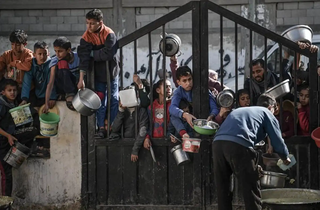Ramesh Rajasingham, Director of Coordination at the Office for the Coordination of Humanitarian Affairs, reported that at least 576,000 people in Gaza, representing one-quarter of the population, are on the brink of famine. He highlighted the looming collapse of agriculture in northern Gaza by May if conditions persist, with the entire population relying heavily on insufficient humanitarian aid for survival.
Maurizio Martina, Deputy Director-General of the Food and Agriculture Organization, emphasized the daily increasing risk of famine in Gaza, where the entire population is facing acute food insecurity. He called for the reopening of border crossings and an immediate humanitarian ceasefire to address the crisis.
Carl Skau, Deputy Executive Director of the World Food Programme, echoed the urgent need for action to prevent famine, stating that without safe and expanded access, relief efforts cannot adequately address the severe humanitarian crisis in Gaza. He reported that the WFP was forced to pause food deliveries to northern Gaza due to safety concerns.
During the discussion that followed, Council members expressed grave concern over worsening food insecurity in Gaza, with many condemning the use of starvation as a method of warfare. Algeria's representative called for a humanitarian ceasefire, highlighting the deliberate violation of international law and the Council's responsibility to act.
Ecuador's representative emphasized the gravity of the situation facing the Palestinian population and called for full implementation of relevant resolutions and a humanitarian ceasefire. China's representative urged Israel to ensure the safety of humanitarian agencies and personnel and facilitate aid deliveries in Gaza.
The United States reiterated its commitment to promoting food security and urged Israel to keep border crossings open for humanitarian aid while the observer for the State of Palestine criticized Israel's actions, accusing it of committing genocidal crimes and using starvation as a method of war. (ILKHA)



 Güncel
Güncel
 Güncel
Güncel
 Güncel
Güncel
 Güncel
Güncel
 Güncel
Güncel
 Ekonomi
Ekonomi
 Güncel
Güncel
 Güncel
Güncel
 Röportaj
Röportaj
 Güncel
Güncel





